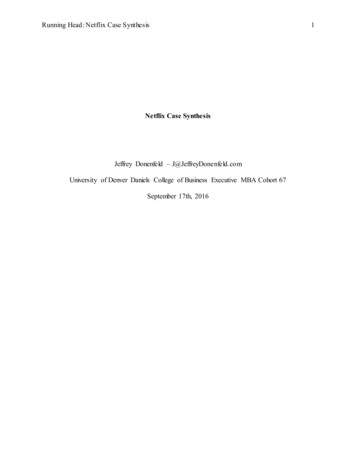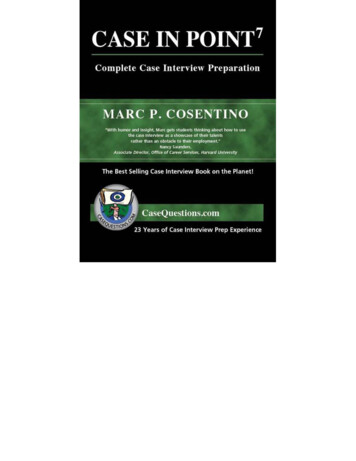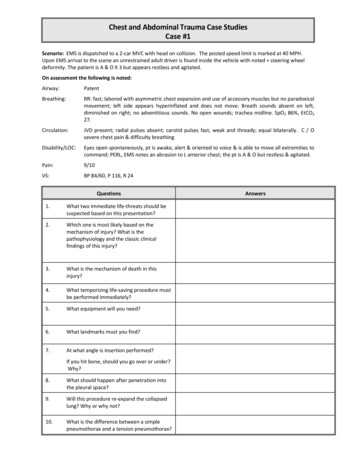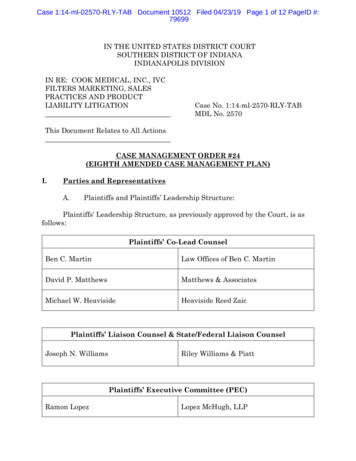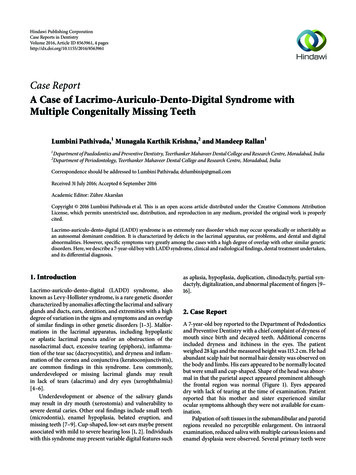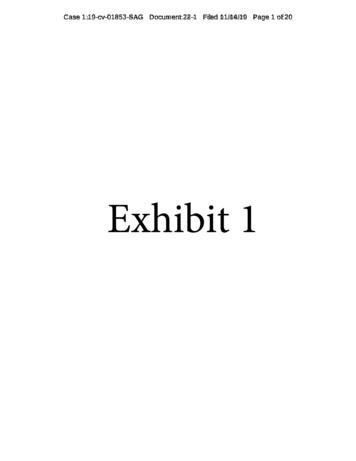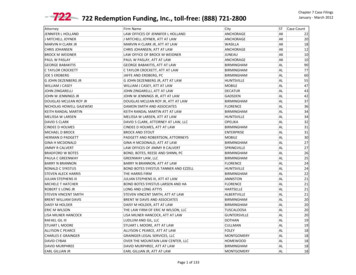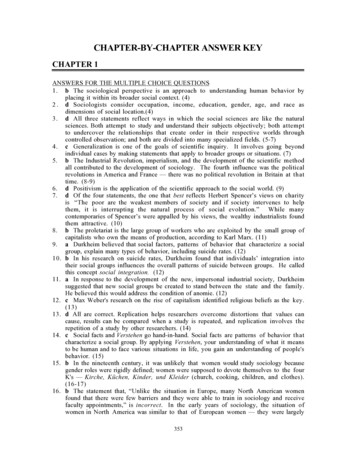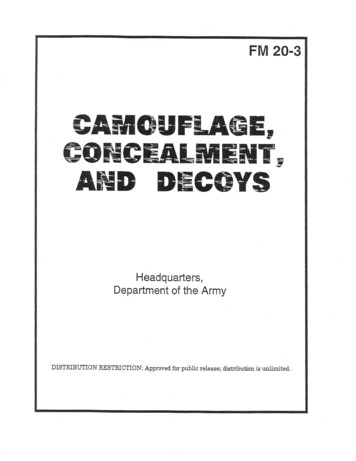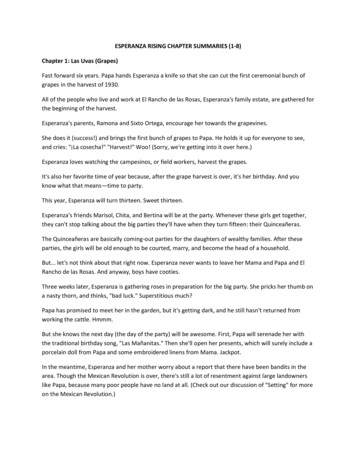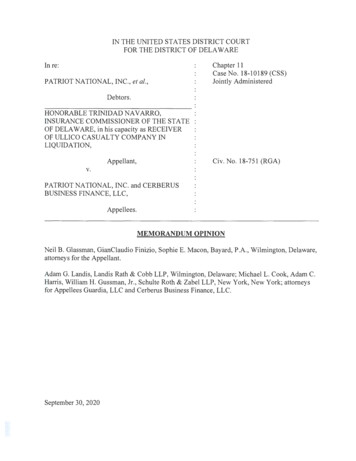
Transcription
IN THE UNITED STATES DISTRICT COURTFOR THE DISTRICT OF DELA WAREIn re :PATRIOT NATIONAL, INC. , et al.,Chapter 11Case No. 18-10189 (CSS)Jointly AdministeredDebtors.HONORABLE TRINIDAD NAVARRO,INSURANCE COMMISSIONER OF THE STATEOF DELAWARE, in his capacity as RECEIVEROF ULLICO CASUALTY COMPANY INLIQUIDATION,Appellant,Civ . No . 18-751 (RGA)V.PATRIOT NATIONAL, INC . and CERBERUSBUSINESS FINANCE, LLC,Appellees .MEMORANDUM OPINIONNeil B. Glassman, GianClaudio Finizio, Sophie E. Macon, Bayard, P .A. , Wilmington, Delaware,attorneys for the Appellant.Adam G. Landis, Landis Rath & Cobb LLP, Wilmington, Delaware; Michael L . Cook, Adam C.Harris, William H. Gussman, Jr. , Schulte Roth & Zabel LLP, New York, New York; attorneysfor Appellees Guardia, LLC and Cerberus Business Finance, LLC.September 30, 2020
Isl Richard G. AndrewsANDREWS, UNITED ST ATES DISTRICT JUDGE:This matter involves two insolvency estates - one bankruptcy and one insurance - in twodifferent forums . The appeal has been filed in the bankruptcy cases of Patriot National, Inc.("PNI") and certain affiliates ("Debtors") by the Honorable Trinidad Navarro, InsuranceCommissioner of the State of Delaware, in his capacity as receiver ("Receiver") of UllicoCasualty Company. The Ullico estate was created on May 30, 2013 when the Court of Chanceryof the State of Delaware entered its Liquidation and Injunction Order with Bar Date("Liquidation Order") pursuant to the Delaware Uniform Insurers Liquidation Act, 18 Del. C. §5901-5944 ("DUILA"). 1 The Debtors' bankruptcy estate was created years later upon the filingof their chapter 11 petitions on January 30, 2018 . Under the authority of the Liquidation Order,which requires the Receiver to marshal and recover assets and administer Ullico ' s estate for thebenefit of creditors, the Receiver filed a petition to compel accounting and turnover of collateralfrom non-debtor Patriot Underwriters, Inc. n/k/a Guarantee Underwriters, Inc. ("GUI") on March13, 2015. 2 The parties dispute whether a proper accounting was provided, and the Receiversought to preserve his rights in connection with the Debtors' plan.The Receiver objected to confirmation on the basis that the proposed plan would impairhis rights under DUILA and the Liquidation Order in violation of the McCarran-Ferguson Act,31The docket of the Chapter 11 cases, captioned In re Patriot National, Inc., No. 18-10189-CSS(Bankr. D. Del.), is cited herein as "B.D.I. ." The appendix (D.I. 26-31) filed in support of theReceiver's opening brief is cited herein as "A . " "Appellees" are Guardia LLC, the reorganizedDebtor, as successor to PNI, and secured lender Cerberus Business Finance, LLC.2Although the Petition was commenced against a non-Debtor affiliated entity, the scope of theaccounting relates to the entire UllicolPatriot Program (defined below) for which the Debtorsproduced bank records including the Patriot/Ullico Account (defined below). (D.1. 38 at 5 n.2).3The McCarran-Ferguson Act provides, in relevant part: "No Act of Congress shall be construedto invalidate, impair, or supersede any law enacted by any State for the purpose of regulating the2
that abstention was required under various statutes and doctrines,4 and that the plan was notproposed in good faith in accordance with§ 1129(a)(3) of the Bankruptcy Code. The Receiverfurther objected to a provision contained in the proposed plan which provided that theBankruptcy Court would have "exclusive jurisdiction" to adjudicate claims and litigation"arising out of, and related to, the Chapter 11 Cases and the Plan." (D.I. 1-1 , Art. X).At the April 24, 2018 confirmation hearing, the Bankruptcy Court issued a bench rulingdetermining that the McCarran-Ferguson Act did not apply and that abstention was notwarranted. (Al065-68). Following supplemental briefing on the retention of exclusivejurisdiction provision, on May 2, 2018, the Court entered a separate order (D.I. 1-2)("Jurisdiction Order"), which determined that the Bankruptcy Court's retention of exclusivejurisdiction provision "does not, at the moment, prejudice any party" and ordered that theConfirmation Order contain language making it subject to objection by any party which believesits rights are being infringed upon. Thereafter, on May 4, 2018, the Court entered an orderconfirming the Debtors' plan (DJ. 1-1) ("Confirmation Order"). The Receiver has appealed theConfirmation Order and Jurisdiction Order on the basis that they unlawfully impede and interferewith his rights under the Liquidation Order and DUILA. For the reasons set forth below, theCourt will affirm both orders.business of insurance, or which imposes a fee or tax upon such business, unless such Actspecifically relates to the business of insurance." 15 U.S.C. § 1012(b). "Congress carved outinsurance companies from the purview of federal bankruptcy law. As a result, the states haveprimary responsibility for regulating insurance, including insurance company insolvencyproceedings." In re Freestone Ins. Co. , 143 A.3d 1234, 1242-43 (Del. Ch. 2016) (cleaned up).4The Receiver asserted that the Bankruptcy Court was required to abstain, or should exercise itsdiscretion to permissively abstain, from abrogating the Receiver' s rights under 28 U.S.C. §1334(c), as well as under the abstention doctrines set forth in Younger v. Harris, 401 U.S. 37(1971) and in Burford v. Sun Oil Co. , 319 U.S. 315 (1943).3
I.BACKGROUNDA.The PartiesIn 2009, insurance company Ullico entered into relationships with non-debtor PatriotUnderwriters, Inc., now known as GUI, to provide workers' compensation insurance through aprogram marketed and operated by GUI (the "Ullico/Patriot Program"). GUI provided "turnkey" insurance services to Ullico, which allowed its capital to be used to backstop losses fromcovered workers compensation risk. Virtually all other aspects of the insurance operation werehandled by the non-insurer service providers, including sales, marketing, management,underwriting, policy issuance, administration, accounting, claims handling, premium collectionand disbursement, collateral collection and disbursement, and subrogation (collectively, the"Ullico/Patriot Program Services"). (See A0233 , 0278). Numerous Ullico large-deductibleworkers compensation insurance policies were issued through the Ullico/Patriot Program.Pursuant to the "Large Deductible Endorsement" attached to the policies, Ullico was authorizedto advance part or all of the applicable deductible amounts, and the insured was required toreimburse Ullico for payments made by the company that were within the deductible. (SeeA0339; A0368; A0380). In order to secure repayment of the deductible and other paymentswhich became due from the insured to Ullico, the insured was required to provide collateral priorto the issuance of the policy. (A0380). GUI entered into program agreements with Ullicoinsureds that required the insureds to deposit collateral with GUI. (A0385; A0406; A0428).B.The LiquidationOn May 30, 2013 , the Court of Chancery entered the Liquidation Order placing Ullicointo liquidation pursuant to §§ 5905 and 5906 of DUILA. The Receiver is vested with "all right,title and interest in, of or to, all of the property of [Ullico ]" (A0027-0030, ,r,r 1-3 and 7); see also18 Del. C. § 5913(b). The Liquidation Order includes a number of provisions authorized by 184
Del. C. § 5904(b) to assist the Receiver in one of his core functions : to marshal the assets andpossible assets of the estate. The Liquidation Order prevents the dissipation of Ullico ' s assets orassets that it may have an interest in; requires the person or entity in possession of the assets tofile an accounting of those assets with the Receiver; and mandates that all assets be turned overto the Receiver. (A0031-0032 at ,i,i 8- 10). Paragraph 9 of the Liquidation Order provides:9. Except as otherwise indicated elsewhere in this Order or except as excluded byexpress written notice provided by the Receiver, all persons or entities holdingAssets of, or on behalf of, ULLICO CASUAL TY shall file with the Receiverwithin ten (10) calendar days of the entry of this Order an accounting of thoseAssets, regardless of whether such persons or entities dispute the Receiver'sentitlement to such Assets.(A0031 at ,i 9). The Liquidation Order prohibits all persons or entities from "exercising anyright adverse to the right ofULLICO CASUALTY to or in the Assets, or in any way interferingwith the Receiver, the Deputy Receiver(s), or the Designees either in their possession and controlof the Assets or in the discharge of their duties hereunder. " (A0032 at ,i 11). Through theLiquidation Order, estate assets are marshaled for the purpose of administering them, includingdistributing assets consistent with DUILA and the Liquidation Order. See DUILA § 5918.C.The Petition to Compel Accounting and TurnoverWithin months of Ullico being placed into liquidation, GUI and its affiliates began anoperational restructuring which took place between 2013 and 2015 . The operationalrestructuring was purportedly designed to separate the insurance-risk-taking business ("GuarantySilo") from the Debtors ' non-risk-bearing insurance-services business ("Patriot Silo"). (SeeA0076 ,i 18). The restructuring is reflected in the 2013-2015 organization charts contained in theregulatory filings of Guaranty Insurance Company ("GIC") with the Florida Office of InsuranceRegulation. (A0227-0232). The charts also reflect the restructuring of the Ullico/Patriot ServiceProviders from the Guaranty Silo to the Patriot Silo; Patriot Risk Services was part of the Patriot5
Silo in 2013, and Patriot Claims Services moved from the Guaranty Silo to the Patriot Silobetween 2013 and 2014. Id. Each of the Ullico/Patriot Service Providers are debtors in thechapter 11 cases.On March 13, 2015, the Receiver filed the Petition to Compel Accounting and Turnover(A0043), 5 which included a demand for the accounting and turnover of over 26,000,000 ofUllico Collateral which GUI reported, as of March 12, 2013, was being held in connection withthe Ullico/Patriot Program (the "Ullico Collateral"). (A0059-0060). The Receiver alleges thatthe Debtors transferred Ullico Collateral by moving it from the Guaranty Silo to the Patriot Silo,consistent with the movement of the Ullico/Patriot Service Providers, and that the Ullico/PatriotService Providers, consistent with their insurance-services business roles, were likely to havepossessed and controlled the Ullico Collateral.The parties dispute whether a proper accounting has been provided. In response todiscovery requests, Debtors provided some bank account statements for account 5225 titled"Patriot Risk Services, Inc. Ullico Casualty" (the "Patriot/Ullico Account") for the periodJanuary 1, 2012 through August 31 , 2017 (A0485-0525). The Patriot/Ullico Account isdesignated as a "restricted account" by the Debtors. (See A0l 70 (identifying account 5225 as a"restricted account")). The Debtors' restricted accounts hold collateral in trust for the benefit ofthird parties. Debtors acknowledge that property held in restricted accounts (of which there wereover two hundred as of the Petition Date) did not constitute property of the Debtors' bankruptcyestate and will not be transferred pursuant to the reorganization. (AO 130-0131 at 1 8; A0901 at92: 13-24). According to the Receiver, the activity reflected in the Patriot/Ullico Account reflects5C.A. No. 8392-VCS, D.I. 87 ("Petition to Compel Patriot Underwriters, Inc., Now PurportedlyKnown as Guarantee Underwriters, Inc., to File an Accounting with the Receiver and toTurnover Certain Collateral Held on Behalf of Ullico Casualty Company to the Receiver).6
ongoing deposits and withdrawals of millions of dollars during the period when theUllico/Patriot Program was active, and during the period immediately following entry of theLiquidation Order. (A0485). Debtors have argued that it was impossible that they had anyinvolvement with Ullico because no Debtor existed at the time Ullico was placed into liquidationin 2013 . The Receiver argues that this is contradicted by records and statements dating Debtors'origins back to 2003 and supporting an affiliation through common ownership. (See A0076).Even if the Debtors were correct, the Receiver asserts, this would not absolve the Debtors oftheir obligation to comply with the Liquidation Order and provide an accounting.D.Confirmation OrderOn April 2, 2018, the Receiver objected to the plan's discharge, injunction, andexculpation provisions on the basis that those provisions impair the Receiver' s rights under theLiquidation Order and under DUILA in contravention of the McCarran Ferguson Act (A07060710) ("Plan Objection"). On April 12, 2018, the Receiver filed a motion seeking abstention andrelief from the automatic stay (A0597) ("Abstention Motion"). At bottom, the relief sought bythe Receiver was the insertion of "carve out" language stating that nothing in the plan wouldmodify or restrict his rights. (A0941 at 132: 17-24).The Plan Objection and the Abstention Motion were heard in conjunction with the planconfirmation hearing on April 24, 2018. At the conclusion, the Bankruptcy Court rendered adecision on the record, overruling the Plan Objection and denying the Abstention Motion. (SeeAl065-1068, 256-259). The Bankruptcy Court declined to abstain, because, among other things,the PNI reorganization case "does not in any way invalidate the [Receiver' s] authority" andbecause confirmation of the Plan was a "core proceeding to which mandatory abstention does notapply. " (Al066 at 257:10-11 ; 257:20-21). The Bankruptcy Court ruled that "federal . .bankruptcy issues . . are involved," not "only state law issues." (A1067 at 258 :6-7). Any state7
proceedings, said the Bankruptcy Court, "simply do not afford an adequate opportunity to raisethe federal claims." (Id. at 258: 15-16). It further noted that a bankruptcy court "has exclusivejurisdiction to determine" the Receiver' s asserted "property rights ." (Id. at 258:21-22).E.Jurisdiction OrderAt the conclusion of the plan confirmation hearing, the Bankruptcy Court requestedsupplemental letter briefs (Al 118-1133) regarding the proposed exclusive jurisdiction provisioncontained in the plan, which provides in pertinent part:. the Bankruptcy Court shall retain exclusive jurisdiction over all mattersarising out of, and related to, the Chapter 11 Cases and the Plan to the fullestextent permitted by law, including, without limitation, jurisdiction to:[ . ]5. hear and determine any and all adversary proceedings, motions, applications,and contested or litigated matters arising out of, under, or related to, the LitigationClaims or the Chapter 11 Cases .(D.I. 1-1 , Art. X) . On May 2, 2018, the Bankruptcy Court entered the Jurisdiction Orderauthorizing the Plan' s exclusive jurisdiction provision. (D.I. 1-2 ,r A). The Bankruptcy Courtdeclined to "order in advance that it retains exclusive subject matter jurisdiction over claims andlitigation not yet commenced[.]" (Id. ,r B (citing Zambelli Fireworks Mtg. v. Wood, 592 F.3d412, 418 (3d Cir. 2010) (" [A] federal court always has jurisdiction to determine itsjurisdiction.")). The Bankruptcy Court noted its inability "to assume jurisdiction it otherwisedoes not have[.] " (D.I. 1-2 ,r B (citing In re Resorts Int'!, Inc., 372 F. 3d 154, 161 (3d Cir. 2004)(" If there is no jurisdiction under 28 U.S.C. § 1334 or 28 U.S.C. § 157, retention of jurisdictionprovisions in a plan . are fundamentally irrelevant.")). The Bankruptcy Court stressed that theplan's "retention of exclusive jurisdiction does not, at the moment, prejudice any party" andordered that its "retention of jurisdiction is subject to objection" by any party. (D.I. 1-2). TheBankruptcy Court reasoned that the Receiver' s jurisdictional challenge was "premature" becausethere was no pending "litigation" between the parties (D.I. 1-2 ,r C). The Bankruptcy Court8
would "address" a jurisdictional challenge "if litigation is commenced." The Jurisdiction Orderwas entered on May 2, 2018, and the Confirmation Order was entered on May 4, 2018.On May 16, 2018, the Receiver filed a timely notice of appeal with respect to both orders.(D.1. 1). The appeal is now fully briefed. (D.I. 25 , 37, 38, 39). The Court did not hear oralargument because the facts and legal arguments are adequately presented in the briefs andrecord, and the decisional process would not be significantly aided by oral argument.II.JURISDICTION AND STANDARD OF REVIEWThis Court has jurisdiction under 28 U.S .C. § 158(a)(l) over "final judgments, orders,and decrees." Bullardv. Blue Hills Bank, 135 S. Ct. 1686, 1692-93 (2015) (bankruptcy courtorder final, appealable if it "alters the status quo and fixes the rights and obligations of theparties"; order confirming plan is "final"). Appellees argue that the portion of the ConfirmationOrder denying the Abstention Motion was an interlocutory ruling, which may only be heard withleave of the Court, which the Receiver failed to address in his opening brief. (D.I. 37 at 2-3). Asthe Receiver correctly points out, however, the record reflects that the contested matterscomprising the Abstention Motion and Plan Objection presented related arguments focused onthe plan's impact on the Receiver's rights under DUILA and the Liquidation Order. The partiesand the Bankruptcy Court agreed that the Receiver's contested matters would be presented andconsidered at the Confirmation Hearing as one contested matter, and these matters wereconsolidated by oral order. (See A0830 at 21:9-13; A0927-28 at 118:22-119:1). Consolidationof contested matters is consistent with Federal Rule of Civil Procedure 42 (applicable tocontested matters through Bankruptcy Rules 9014 and 7042). The Confirmation Order (whichincludes the Bankruptcy Court's oral rulings) denied and overruled the Receiver' s consolidatedAbstention Motion and Plan Objection, and it is a final determination of the contested matter,appealable as ofright in accordance with 28 U.S.C. § 158(a)(l).9
This appeal seeks review of the Bankruptcy Court's legal conclusions regarding (i) theapplicability of the McCarran-Ferguson Act and its preemption of the Bankruptcy Court' sjurisdiction, (ii) the applicability of mandatory or permissive abstention, and (iii) theappropriateness of abstention pursuant to the Younger and Burford doctrines. Where the appealpresents mixed questions of law and fact, I accept the Bankruptcy Court's finding of historical ornarrative facts unless clearly erroneous, but exercise plenary review of the Bankruptcy Court'schoice and interpretation of legal precepts and its application of those precepts to the historicalfacts . In re SemCrude, L.P., 526 B.R. 556, 559 (D. Del. 2014).III.ANALYSISWhile the Receiver raises several issues on appeal , the crux of his arguments is that theeffect of the Jurisdiction Order and the Confirmation Order was to "eliminate the Receiver' sability to compel the Debtors' compliance with the Liquidation Order, denuding the Court ofChancery's jurisdiction and ability to exercise oversight of the Ullico estate and the assetscomposing same." (D.I. 25 at 27). Specifically, the Receiver argues that the Court of Chanceryshould be the court to enforce its own Liquidation Order and determine consequences, if any, forviolations of its provisions requiring the accounting and turnover of Ullico ' s collateral andenjoining actions detrimental to the Ullico estate. Conversely, Appellees argue that the orderswere properly entered, as the Bankruptcy Court has exclusive jurisdiction over the Debtors'property and the exercise of that jurisdiction does not impair DUILA. Appellees further assertthat the Receiver has never filed a proof of claim or initiated an adversary proceeding, so theBankruptcy Court properly ruled that the Plan Objection was premature and declined to issue anadvisory opinion. Finally, Appellees asse
Casualty Company. The Ullico estate was created on May 30, 2013 when the Court of Chancery of the State of Delaware entered its Liquidation and Injunction Order with Bar Date ("Liquidation Order") pursuant to the Delaware Uniform Insurers Liquidation Act, 18 Del. C. §
